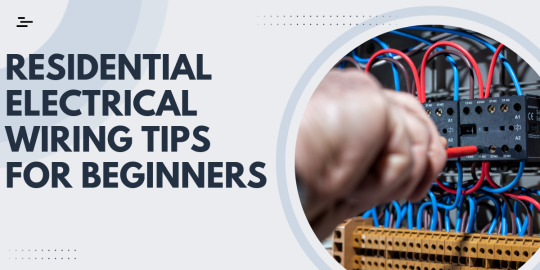#TroubleshootingElectrical
Explore tagged Tumblr posts
Text
Residential Electrical Wiring Tips for Beginners

Welcome to our guide on residential electrical wiring tips for beginners. Whether you're looking to tackle a simple electrical project or just want to understand the basics of electrical wiring in your home, this guide will provide you with the knowledge you need. At Total Power energy, we believe that safety and knowledge go hand in hand when it comes to electrical work.
Safety First
Before we delve into the technical aspects of residential electrical wiring, let's emphasize that safety should always be your top priority. Electrical work can be hazardous, and taking the necessary precautions is crucial. Ensure you have the following safety equipment on hand:
Safety goggles
Insulated gloves
Non-conductive footwear
Circuit tester
Fire extinguisher
Remember, if you ever feel unsure or uncomfortable, it's best to consult a professional electrical contractor in Seattle who specializes in electrical services. Your safety is not worth the risk.
Understanding Electrical Basics
To begin, let's demystify some electrical jargon. Understanding a few fundamental concepts can go a long way:
Voltage: Think of voltage as electrical pressure. It's the force that pushes electricity through wires.
Current: Current is the flow of electricity. Imagine it as the water flowing through a pipe.
Resistance: Resistance opposes the flow of current. It's like a narrowing in the pipe that restricts water flow.
Circuit Breakers and Fuses: These are your electrical safety net. They protect your home from electrical overloads.
Tools and Equipment
Every DIY electrical enthusiast needs the right tools. Here's a list of essential equipment:
Screwdrivers (flathead and Phillips)
Wire strippers
Wire nuts
Electrical tape
Wire connectors
Voltage tester
Wire cutters
Fish tape (for running wires through walls)
For more complex projects, consider investing in a multimeter and a wire tracer. These tools can be invaluable when troubleshooting.
Planning Your Wiring Project
Planning is the key to a successful electrical wiring project. Before you start, create a wiring diagram that outlines your project. Identify all circuits and outlets in your home. This diagram will serve as your roadmap and help prevent mistakes.
Wiring Tips
Now, let's get down to business. Here are some essential wiring tips for beginners:
Turn Off the Power: Always turn off the power to the area you're working on at the circuit breaker or fuse box. Use a voltage tester to double-check that the power is off.
Connect Wires Properly: When connecting wires, follow color-coded conventions (usually black for hot, white for neutral, green or bare for ground). Use wire connectors and secure them with electrical tape.
Secure Wires and Cables: Use cable staples or straps to secure wires to studs and joists. Keep wires away from sharp edges and hot surfaces.
Label Everything: Label switches, outlets, and the circuit breaker panel to avoid confusion in the future.
Troubleshooting Common Issues
Despite your best efforts, issues can arise. Here are some common problems and their solutions:
Tripped Circuit Breaker: If a circuit trips frequently, it's likely overloaded. Reduce the load or consult an electrical contractor for an upgrade.
Flickering Lights: Loose bulbs or connections can cause flickering lights. Tighten connections or replace faulty bulbs.
Dead Outlets: If an outlet doesn't work, check the circuit breaker and reset it. If that doesn't work, consult an electrical services professional.
When to Seek Professional Help
While DIY electrical work can be rewarding, there are instances when it's best to leave it to the experts. Seek professional help when:
Dealing with major electrical upgrades or installations.
Diagnosing complex electrical issues.
You're unsure about your abilities or the safety of the project.
Conclusion
In conclusion, residential electrical wiring for beginners doesn't have to be intimidating. Armed with the right knowledge, tools, and safety precautions, you can tackle small projects with confidence. However, always remember that your safety is paramount, and for anything beyond basic tasks, it's wise to consult experienced electrical contractors who offer electrical installation and electrical services.
#ElectricalWiring#DIYElectrical#ElectricalSafety#WiringBasics#HomeImprovement#ElectricalTools#ElectricalDiagram#TroubleshootingElectrical#ElectricalContractors#ResidentialElectrical#ElectricalServices#WiringProjects#SafetyFirst#ElectricalTips#WiringGuide#ElectricalBeginners#HomeElectrical#ElectricalUpgrades#ElectricalInstallation#ProfessionalElectricians
1 note
·
View note
Photo

You hate to call an electrician only to find out it was an easy fix. Checkout today’s post on DigThisDesign.net about troubleshooting electrical problems. #homeimprovement #troubleshootingelectrical #diy https://www.instagram.com/p/ByAbhGKA8bJ/?igshid=x3es1a7lq6ws
0 notes